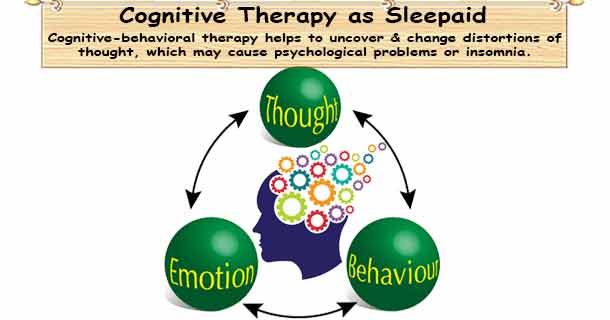Cognitive-behavioral therapy helps to uncover (know) and change distortions of thought, which may be causing psychological problems or insomnia.
Cognitive-behavioral therapy is the base on the idea that our thought causes our feelings and behaviors, not external things. Thus by changing the way of thinking can result in better feel /act.
Insight of cognitive-behavioral therapy
Thoughts mediate between stimuli (such as external events), and emotions. A stimulus brings out a though, which in turn give rise an emotion. Clearly that it is not the stimulus itself bring out emotional response directly, but our evaluation (thought or judgment) about the stimulus.
Two assumptions support the approach of the cognitive-behavioral therapist:
- Capable of becoming aware of his or her own thoughts and of changing them,
- Sometimes the thoughts bring out by stimuli distort or otherwise fail to reflect reality accurately.
Let see a common example of alternative thoughts or beliefs about the same experience and their resulting emotions:
Stimuli: One attended an interview and not selected.
A low sprite person
Thought: I am fundamentally incompetent to this job.
Emotion: Depressed, might be less likely to apply for similar jobs in the future.
A high sprite person
Thought: The competitive candidates are exceptionally strong.
Emotion: It disappointed but not depressed, tries to increase knowledge and might be likely to apply for similar jobs in the future.
Thus, cognitive-behavioral therapy conveys that psychological distress is causing by undesired thoughts about the stimuli-giving rise to disastrous emotions.
The objective of CBT is to correct the thoughts to prevent disastrous emotion even if the stimuli are negative characteristic.
CBT sleep insomnia
Cognitive-behavioral therapy has been finding to be effective in reducing medication usage in the treatment of sleep-related problems. CBT can improve the outcome and reduce sleep medication consumption in the treatment of chronic sleep problems. Persistent improvement in sleep quality & quantity and significant improvement in vitality, physical and emotional health can be absorbed during CBT treatments.
The most important aspect of cognitive behavior therapy (CBT) for sleep disorders is that it actually provides treatment for the cause and not just for the symptoms as medication does.
CBT helps to reduce worry, anxiety, and fear that can disturb the normal sleep cycle by providing accurate information regarding sleep. For example, CBT helps to recognize that one got more (enough) sleep than his or her thought (that is it is a common misconception that lighter sleep stages as wakefulness) and support to understand that one need less sleep than his/her thought (that is just five-hour sleep is enough). Thus, CBT help to reduce anxiety about not getting enough sleep and lead to being able to relax and sleep better.
In addition, the technique help people identify challenge and replace negative, inaccurate sleep thoughts with accurate, positive ones. Negative sleep thoughts can occur during the night (I would not be able to function tomorrow if I do not get enough sleep) as well as during the day (I got an awful night last night, so I will have a terrible working). Positive sleep thoughts are used to replace the negative thoughts with more accurate information (even if I not get enough sleep tonight, I can be able to perform well at work tomorrow, that happen many other nights like this).

